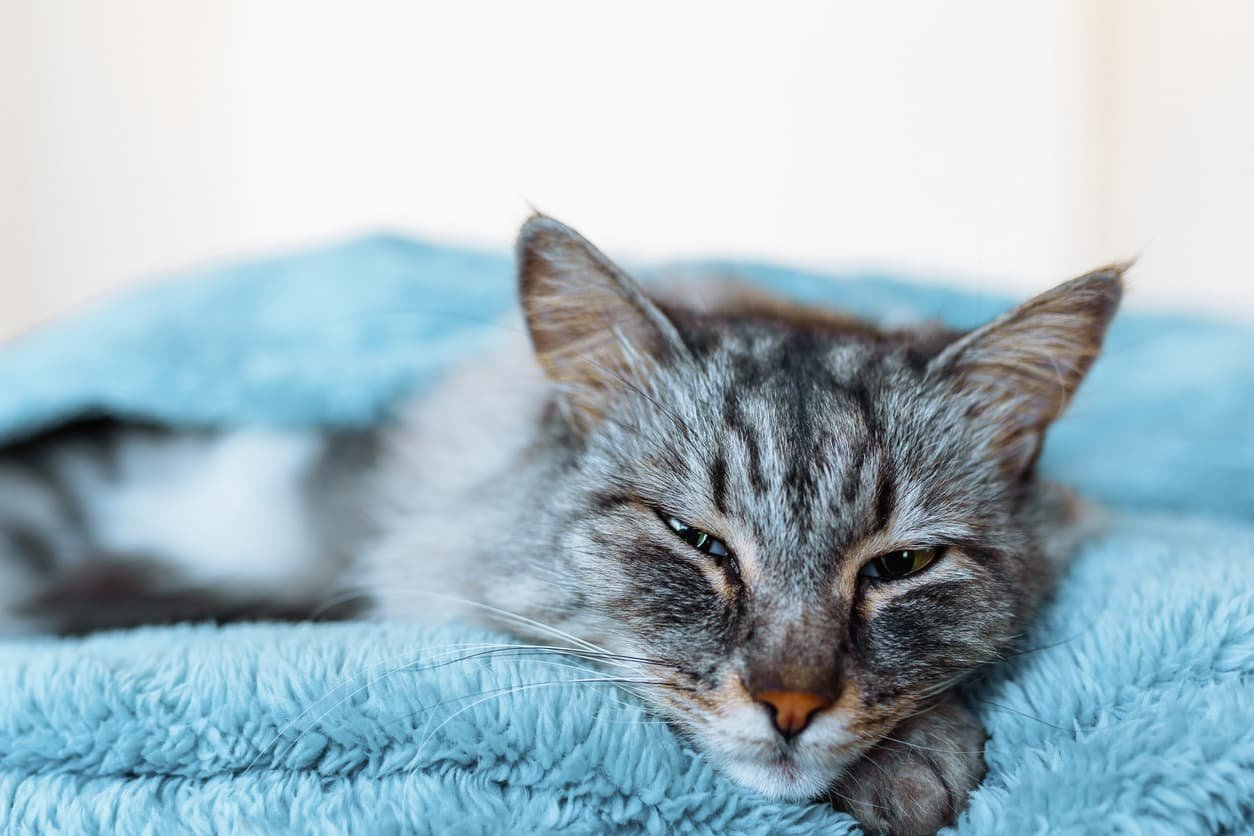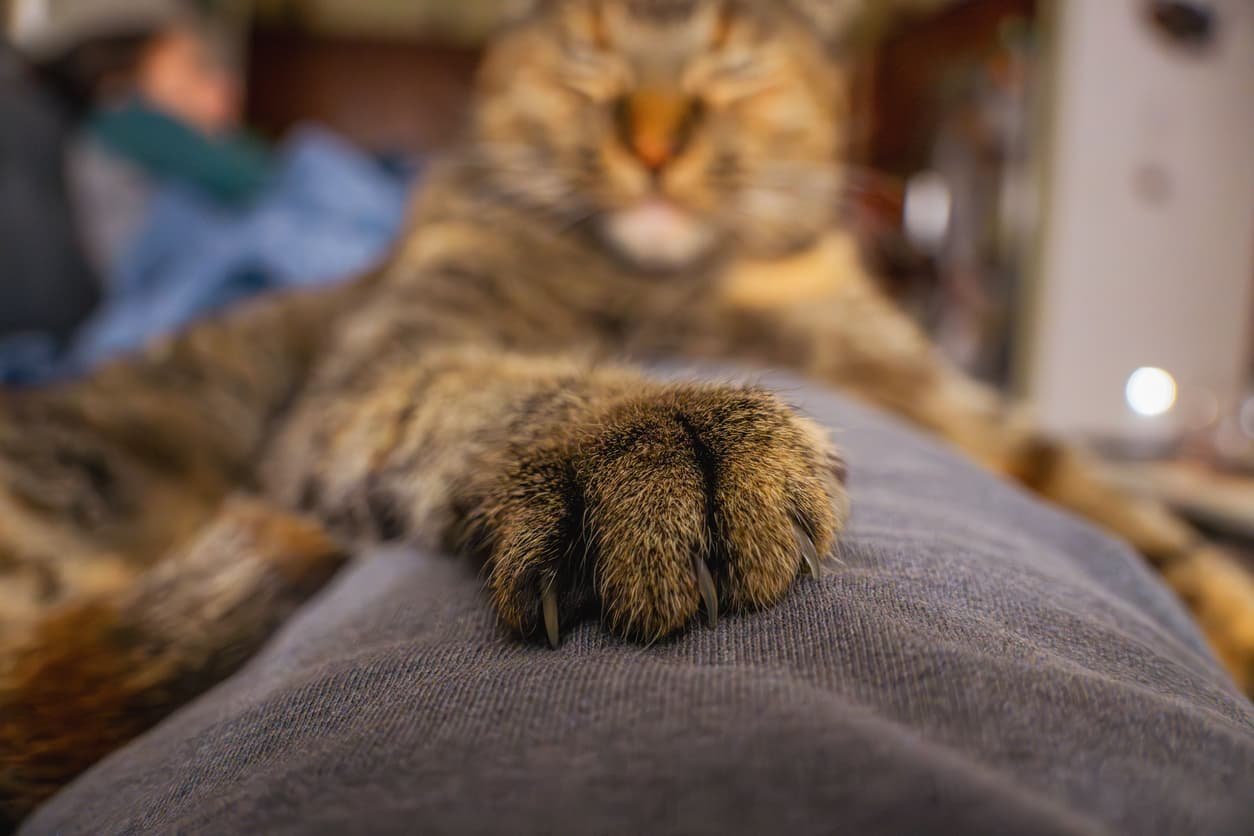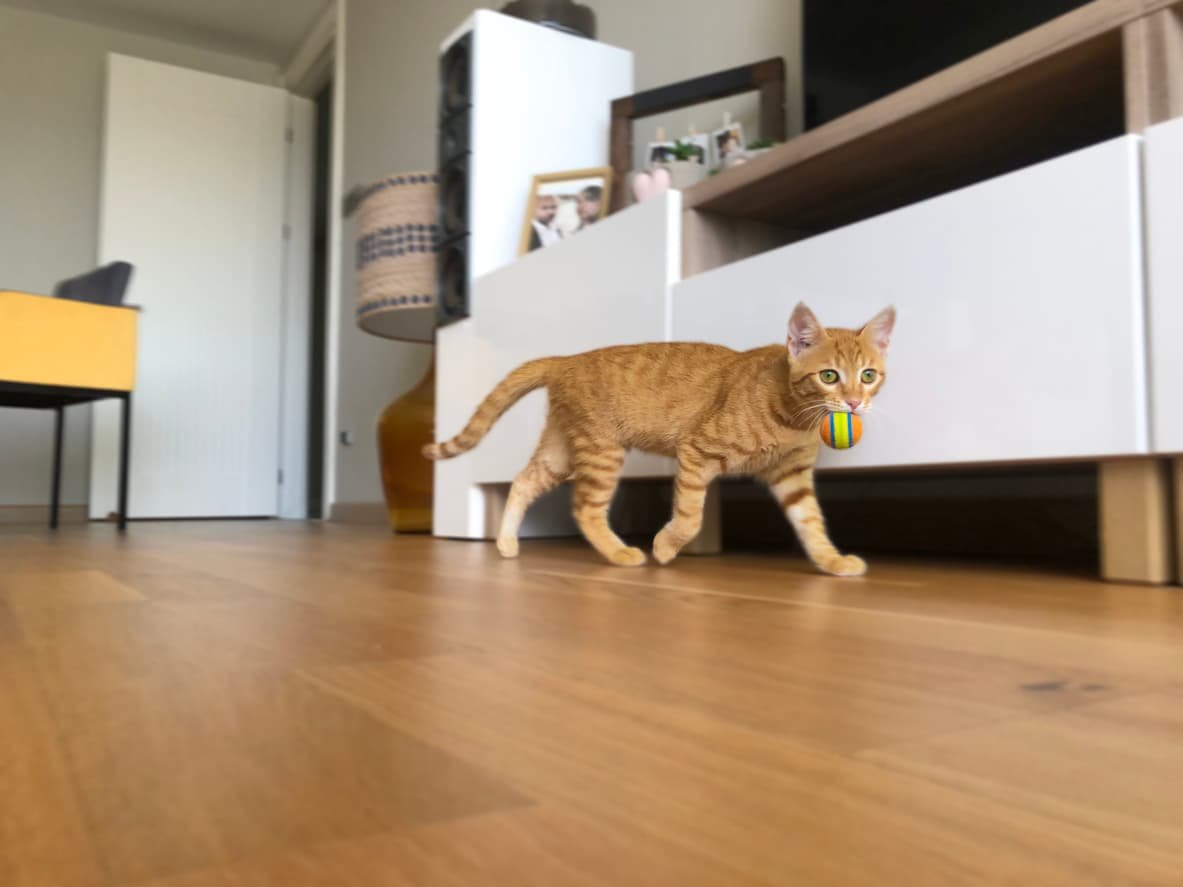Cats are known for their love of sleep. Whether they’re curled up on a cozy blanket, lounging on a cat tree, or enjoying a cat nap in a sunny spot, house cats and their wild relatives spend a lot of time sleeping. But why do cats sleep so much? The answer lies in their natural instincts, evolutionary history, and overall health needs.
Table of Contents
ToggleWhy Do Cats Sleep So Much? How Much Sleep Do They Need?
Cats sleep for about 12 – 20 hours a day, making them one of the sleepiest domestic animals. A cat’s sleep time varies depending on their age, lifestyle, and health conditions. The number of hours a cat sleeps depends on various factors, including its environment and overall well-being.
To better understand cat sleeping habits, check out this guide from American Association of Feline Practitioners on feline health and behavior.
- Younger Cats and Adolescent Cats: These energetic felines experience periods of intense playfulness and brief bursts of energy, requiring a lot of sleep for proper growth and development.
- Adult Cats: As they reach maturity, adult cats develop set sleeping schedules, often aligning their naps with their human family’s daily routine.
- Senior Cats and Older Cats: Aging felines require even more rest due to less energy and potential health concerns like kidney disease, liver disease, or heart disease.
- Indoor Cats vs. Outdoor Cats: An indoor cat tends to have a more predictable sleep pattern, while outdoor cats often adapt their sleeping schedule to hunting opportunities and environmental factors.
Why Do Cats Sleep So Much? Understanding Their Sleep Cycle
Cats experience different sleep patterns, including light sleeping and deep sleep. Their sleep cycle consists of two main phases:
- Light Sleeping: Cats are natural predators, and their survival instincts keep them in a state of alertness even while resting. This is why they often appear to be dozing yet remain responsive to sudden noises or movements.
- Deep Sleep: During this phase, cats enter REM sleep (Rapid Eye Movement), which is crucial for brain function, memory retention, and overall health. This phase allows them to recharge after spending so much time in an alert state.
Why Do Cats Sleep So Much? The Main Reasons
- Natural Hunting Instincts Unlike humans, who have a set amount of sleep per day, cats follow a polyphasic sleep pattern, meaning they sleep in multiple periods of time. Their wild ancestors and modern wild cats require much sleep to conserve energy for their next hunt. Even though domestic cats don’t need to hunt for their next meal, their bodies still follow this evolutionary rhythm.
- Conserving Energy Cats experience brief bursts of energy followed by long periods of rest. Whether they are stalking a toy mouse or chasing a laser pointer, pet cats use up a lot of energy in short intervals and need plenty of sleep to recover. This is part of a cat’s sleep schedule that aligns with their natural instinct.
- Maintaining Overall Health A cat’s immune system relies on adequate rest. Proper sleep helps protect against illnesses and supports the body’s natural ability to fight infections. If a cat is experiencing excessive sleeping, it may indicate an underlying health issue, such as a medical condition or an immune system disorder. Concerned cat owners should monitor any sudden change in their pet’s sleeping habits, as it could indicate a health concern.
- Temperature Regulation Cats have a higher body temperature than humans, making them more prone to heat exhaustion. Sleeping helps regulate their body temperature and keep them cool, especially during the warmer months. This is particularly important for indoor cats who may have limited access to natural temperature variations.
- Mental Stimulation and Memory Processing Sleep is essential for processing new experiences and reinforcing learning. Whether a cat is mastering a new trick or figuring out the best way to climb a scratching post, proper sleep plays a crucial role in memory retention and cognitive function. Spending quality time with a cat through play and interaction can ensure they get the mental stimulation they need before resting.
The Importance of a Cat Tunnel Bed
A cat tunnel bed is a great way to provide your feline friend with a cozy and secure sleeping environment. These beds offer a comfortable space where cats can curl up for a peaceful nap while also satisfying their natural instinct to hide and feel safe. Cat tunnel beds often combine elements of a tunnel and a plush resting area, making them perfect for cats who love to burrow or enjoy enclosed spaces. This type of bed can also help reduce anxiety, as it provides a sense of security and warmth. For cat parents looking to enhance their pet’s sleeping experience, investing in a cat tunnel bed is an excellent choice that promotes better rest and relaxation.
Why Do Cats Sleep So Much? When to Be Concerned
While it’s normal for cats to sleep a lot, sudden changes in their sleeping patterns can indicate health concerns. Here are some signs that may require medical advice:
- Excessive Sleeping: If your cat is sleeping more than usual and showing less interest in playtime, food, or interaction, it could be a sign of a health problem.
- Erratic Sleep Patterns: A significant change in a cat’s normal sleep patterns, such as staying awake all night or being restless, could point to a medical condition.
- Lack of Energy: A cat that suddenly has less energy, avoids movement, or seems weak may be experiencing a health emergency.
- Weight Loss or Changes in Appetite: If a cat is sleeping more and also losing weight or refusing food, an underlying health issue may be present.
- Pattern Changes: A recognizable pattern of sleeping is part of a cat’s behavior, and any sudden disruptions should be noted.
Why Do Cats Sleep So Much? How to Ensure Quality Sleep
- Create a Comfortable Sleeping Environment
- Provide cozy cat beds, cat trees, or soft blankets in quiet areas. Fluffy sleeps in a peaceful location can improve their rest.
- Avoid loud noises or sudden disturbances near their sleeping spots.
- Encourage Mental and Physical Stimulation
- Play with interactive toys, scratching posts, or cat toys to keep them engaged.
- Provide climbing structures to mimic their natural instincts.
- Maintain a Consistent Routine
- Set sleeping schedules by feeding and playing with your cat at the same time each day.
- Keep a recognizable pattern of sleeping to help your cat feel secure.
The Role of Twilight Hours in a Cat’s Sleep Cycle
Cats are crepuscular creatures, meaning they are most active during the twilight hours of dawn and dusk. This explains why they might wake their owners early in the morning or zoom around the house at night. Their sleep schedule is linked to these natural rhythms, making their behavior different from that of humans.
Final Thoughts
Understanding why do cats sleep so much helps cat parents recognize normal behavior versus potential health concerns. A lot of sleep is a natural part of a feline friend’s life, and as long as there are no sudden changes, cat owners can rest assured that their pet is simply following its instinctive routine. However, if you notice any significant changes, seeking medical advice for an accurate diagnosis of your pet’s condition is always a good idea.
By appreciating your cat’s sleeping habits and providing them with a safe, stimulating environment, you ensure that they stay happy, healthy, and well-rested for years to come. The main reasons for their extended sleep cycles are rooted in natural instinct, energy conservation, and overall well-being. As much cats love to sleep, understanding their needs can help cat owners develop a strong bond with their pets. For informational purposes, always consult a vet if you suspect any health concern related to your cat’s sleep patterns.
FAQ
Is it normal for cats to sleep all day?
Yes, it is completely normal for cats to sleep for most of the day. Cats typically sleep between 12 to 20 hours a day, depending on their age, health, and activity level. Their natural instinct as predators means they conserve energy for short bursts of activity, even if they live indoors. However, if your cat experiences a sudden change in sleeping habits, it’s best to monitor their behavior and consult a vet if needed.
Do cats sleep for 70% of their lives?
Yes, on average, cats spend about 70% of their lives sleeping. Since most cats sleep 12 to 20 hours per day, their lifetime sleep percentage is significantly higher than that of humans. This typical sleeping pattern is a result of their natural hunting instincts, which require them to rest frequently to stay sharp and ready for action.
Are cats happy if they sleep a lot?
Not necessarily. While much sleep is normal for cats, excessive sleeping could be a sign of boredom, stress, or an underlying health concern. A happy cat will have a balance between sleep, play, and interaction. If your cat is sleeping more than usual, lacks energy during wakeful periods, or avoids socializing, it might be time to provide more mental stimulation or consult a vet to rule out medical conditions.
How many hours a day do cats sleep by age?
The number of hours a cat sleeps depends on its age: Kittens (0-6 months): 18-22 hours per day, as they need sleep for rapid growth. Adolescent cats (6 months – 2 years): 12-16 hours, with more bursts of activity. Adult cats (2-10 years): 12-20 hours, depending on their lifestyle and health. Senior cats (10+ years): 16-22 hours, as they tend to have less energy and sleep longer due to aging. If a cat’s sleep cycle changes drastically, it could indicate pattern changes linked to a health issue. Always consult a vet if you notice significant changes in your cat’s sleeping habits
Is it normal for my cat to sleep 20 hours a day?
Yes, cat sleeping 20 hours a day can be normal, especially for kittens, seniors, or very relaxed cats. Cats are natural nappers, and as long as they’re healthy and active when awake, it’s usually nothing to worry about.
Why does my cat sleep on me?
The cat sleeps on me meaning is often about trust, warmth, and bonding. Your cat feels safe and comforted by your scent, heartbeat, and body heat—choosing you as their favorite cozy, secure spot.
Do cats dream when they sleep?
Yes, the answer to do cats dream is a resounding yes! Like humans, cats experience REM sleep, during which their brains show activity linked to dreaming—often seen as twitching paws, whiskers, or soft sounds.







